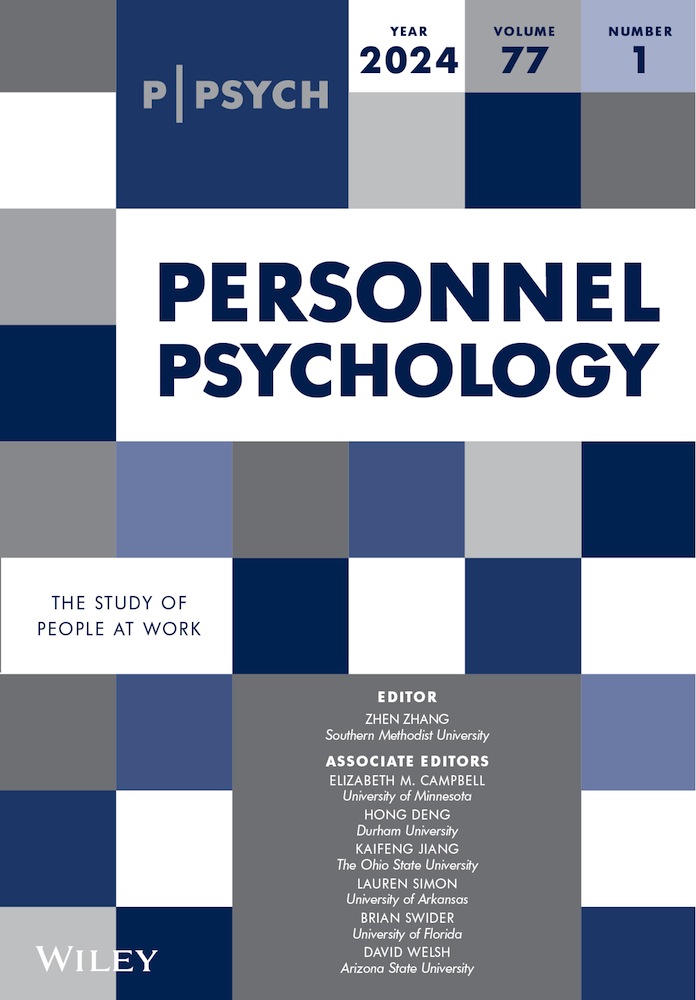当新旧自我碰撞:前企业家的身份冲突和创业怀旧
IF 6.4
2区 心理学
Q1 MANAGEMENT
引用次数: 0
摘要
经历职业转型的人经常会将旧角色的某些方面带入新的工作环境,这种界面会在一个人的工作自我的挥之不去的方面和一个人的工作自我的新方面之间产生冲突。然而,我们对新旧自我之间的冲突如何影响员工的工作成果知之甚少。我们在前企业家中研究了这个问题,这些人从企业主转变为工资雇员。根据角色认同理论,我们建立了一个模型,描述了挥之不去的企业家身份和当前的工作角色身份之间冲突的后果。我们认为,经历过更高程度身份冲突的前企业家更有可能经历倦怠,更不可能参与雇主的支持,这些关系可以用较低水平的感知职业身份增长(即进步身份)来解释。我们进一步认为,冲突对进步身份的负面影响会因对过去创业经历的怀念而加剧。在对前企业家和他们的浪漫伴侣进行的三阶段实地调查中,我们发现了对这些假设的支持,同时使用了伴侣评估结果和自我评估结果。我们讨论了对组织中创业职业和工作认同的文献启示。本文章由计算机程序翻译,如有差异,请以英文原文为准。
When old and new selves collide: Identity conflict and entrepreneurial nostalgia among ex‐entrepreneurs
Abstract People undergoing career transitions often bring aspects of old roles into their new work contexts, and this interface can create conflict between lingering aspects of one's work self and the newer aspects of one's work self. Yet, we know little about how this conflict between old and new selves shapes employee outcomes. We examine this issue among ex‐entrepreneurs—individuals who have transitioned from a business owner to a wage employee. Drawing from role identity theory, we develop a model of the consequences of conflict between a lingering entrepreneur identity and a current work role identity. We propose that ex‐entrepreneurs who experience higher levels of identity conflict will be more likely to experience burnout and less likely to engage in boosterism of their employer, and that these relationships are explained by lower levels of perceived professional identity growth (i.e., progressive identity). We further suggest that the negative effect of conflict on progressive identity is exacerbated by nostalgia for one's entrepreneurial past. In a three‐stage field survey of ex‐entrepreneurs and their romantic partners, we found support for these hypotheses using both partner‐rated outcomes and self‐rated outcomes. We discuss implications for the literature on entrepreneurship careers and work identity in organizations.
求助全文
通过发布文献求助,成功后即可免费获取论文全文。
去求助
来源期刊

Personnel Psychology
Multiple-
CiteScore
10.20
自引率
5.50%
发文量
57
期刊介绍:
Personnel Psychology publishes applied psychological research on personnel problems facing public and private sector organizations. Articles deal with all human resource topics, including job analysis and competency development, selection and recruitment, training and development, performance and career management, diversity, rewards and recognition, work attitudes and motivation, and leadership.
 求助内容:
求助内容: 应助结果提醒方式:
应助结果提醒方式:


